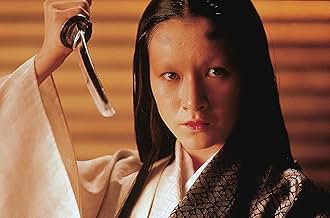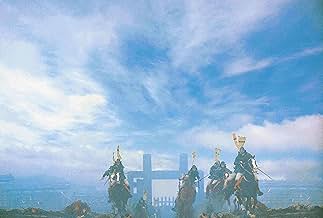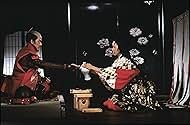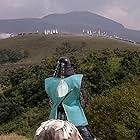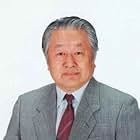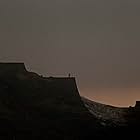In Medieval Japan, an elderly warlord retires, handing over his empire to his three sons. However, he vastly underestimates how the new-found power will corrupt them and cause them to turn o... Read allIn Medieval Japan, an elderly warlord retires, handing over his empire to his three sons. However, he vastly underestimates how the new-found power will corrupt them and cause them to turn on each other...and him.In Medieval Japan, an elderly warlord retires, handing over his empire to his three sons. However, he vastly underestimates how the new-found power will corrupt them and cause them to turn on each other...and him.
- Won 1 Oscar
- 30 wins & 23 nominations total
Mansai Nomura
- Tsurumaru
- (as Takeshi Nomura)
Summary
Reviewers say 'Ran' is celebrated for its epic scale, masterful direction, and stunning visuals. Adapted from Shakespeare's 'King Lear,' it is lauded for its intricate narrative, powerful performances by Tatsuya Nakadai and Mieko Harada, and deep exploration of power, corruption, and betrayal. The cinematography and battle scenes are noted for their grandeur. Some find its slow pace and long runtime challenging, yet it is often hailed as one of Kurosawa's finest works.
Featured reviews
With RAN (1985) Akira Kurosawa seems to be setting up a macarbe trap. The first section of the film is slow, following an aging warlord (Tatsuya Nakadai's best acting in a long wonderous career.) dividing his castles amongst his unsavory sons. The action is slow, people talk in low tones, it's almost at snail's pace. But then, a battle scene like nothing you ever seen before explodes on the screen. The film takes a 180 degree turn and becomes more and more sinister, more compelling. You can't look away.
Akira Kurosawa (1910-1997) was responsible for elevating Japanese cinema to a front-runner in world cinema. Two of his films, RASHOMON and SEVEN SAMURAI were made in less than ten years after World War II. These films put a spotlight on Japanese culture. Some of his later films, THE HIDDEN FORTRESS, THE BAD SLEEP WELL, YOJIMBO and HIGH AND LOW became the basis for a good percentage of the major American films produced after 1960.
If you sit down to see RAN, be prepared for a jaw-dropping experience.
Akira Kurosawa (1910-1997) was responsible for elevating Japanese cinema to a front-runner in world cinema. Two of his films, RASHOMON and SEVEN SAMURAI were made in less than ten years after World War II. These films put a spotlight on Japanese culture. Some of his later films, THE HIDDEN FORTRESS, THE BAD SLEEP WELL, YOJIMBO and HIGH AND LOW became the basis for a good percentage of the major American films produced after 1960.
If you sit down to see RAN, be prepared for a jaw-dropping experience.
'Ran' is the Japanese word for chaos, riot, dissension. Akira Kurosawa's masterpiece is indeed a feast of destruction and perdition, charged with symbols and powerful in pictures like it is found very rarely in today's cinema.
The dusky story is based on Shakespeare's 'King Lear'. In the film a Japanese warlord celebrates his own downfall. Kurosawa devised this with a radical film language which works with certain imageries of colors, rapid cut sequences and a sophisticated sound design. When the colorful flags of the different armies get intermixed in a battle, when the peacefully quiet wind (which carries the soundtrack) swells to a raving storm or when long wide shots suddenly segue into shots of details that follow hot on each other's heels then you realize Kurosawa's incredible style which deeply influenced the cinema worldwide.
The drawings of the characters are equally terrific. Hidetora's jester is for a certain reason always at the side of the warlord. Their relationship alters as the film continues: Jester and warlord change their roles which makes it hard to distinguish both. Just as the sky turns from blue to grey with dark clouds, the violent past of Hidetora is catching up the aging lord. His trail of murder and predation is not forgotten, the brutally conquered land still carries the old scarves of war and exploitation which now burst out again.
The viewer can take this monumental work as a warning to the destructive power of war, which is even decades later at present and beset those who seed the violence.
The dusky story is based on Shakespeare's 'King Lear'. In the film a Japanese warlord celebrates his own downfall. Kurosawa devised this with a radical film language which works with certain imageries of colors, rapid cut sequences and a sophisticated sound design. When the colorful flags of the different armies get intermixed in a battle, when the peacefully quiet wind (which carries the soundtrack) swells to a raving storm or when long wide shots suddenly segue into shots of details that follow hot on each other's heels then you realize Kurosawa's incredible style which deeply influenced the cinema worldwide.
The drawings of the characters are equally terrific. Hidetora's jester is for a certain reason always at the side of the warlord. Their relationship alters as the film continues: Jester and warlord change their roles which makes it hard to distinguish both. Just as the sky turns from blue to grey with dark clouds, the violent past of Hidetora is catching up the aging lord. His trail of murder and predation is not forgotten, the brutally conquered land still carries the old scarves of war and exploitation which now burst out again.
The viewer can take this monumental work as a warning to the destructive power of war, which is even decades later at present and beset those who seed the violence.
One of the last great films directed by Akira Kurosawa. A father gives his land and his power to his three sons. They turn against each other and against their father.
Based on Shakespeare's King Lear 'Ran' is a very good film. It was very expensive and you can see that. Over ten years Kurosawa was busy on this project and in 1985 it was finally there. Very well made, with beautiful costumes, music and cinematography, a great direction and some good performances. Although I think Kurosawa has done better ('Rashomon', 'Ikiru', 'Yojimbo' and of course 'Shichinin no Samurai') 'Ran' definitely belongs to his best.
Based on Shakespeare's King Lear 'Ran' is a very good film. It was very expensive and you can see that. Over ten years Kurosawa was busy on this project and in 1985 it was finally there. Very well made, with beautiful costumes, music and cinematography, a great direction and some good performances. Although I think Kurosawa has done better ('Rashomon', 'Ikiru', 'Yojimbo' and of course 'Shichinin no Samurai') 'Ran' definitely belongs to his best.
I would agree with Ebert's review on a point, that Akira Kurosawa, legendary director of such samurai classics as Seven Samurai, Yojimbo, Hidden Fortress, and Kagemusha, as well as human dramas like Rashomon, The Lower Depths, and Red Beard, could really best direct this film in his old age. There's something about his version of the doomed King Lear of Shakespeare, his Lord Hidetora Ichimonji that could be truly captured by someone in old age. Not to say that directors can't make great films when they're young, or in middle age, about a man in the dark days of the golden years (About Schmidt, Tokyo Story, Bob Le Flambeur, and Kurosawa's own Ikiru come to mind). But it's clear that Kurosawa must've seen or felt or understood at least an element of Hidetora's character, something that goes beyond tragedy that is stuck with all who are mortal.
At one point when Hidetora is in a wandering, dazed state he says "I am lost", to which his companion/caretaker Kyoami responds "Such is the human condition." Was Kurosawa lost as an artist and filmmaker as he tried to get his epic (which at the time of it's filming was the most expensive Japan had seen, and got some extra backing from outside European backers) off the page and onto celluloid? Hard to say, but the end result displays that even in his later days he could create a work so wonderful, so sad, so brutal, and so human that it will remain timeless. If Kurosawa deserves praise for look of the film, the pacing, the editing, every single painstakingly storyboarded (painted) shot, and his direction with the two battle sequences as well as with the quieter, more compelling scenes with the actors, the man who plays Hidetora deserves some as well (like any production of King Lear, including Godard's wild treatise with Burgess Meredith in the lead role, the actor is as important as the writer). Tatsuya Nakadai, who had roles in past Kurosawa films as a young man in Yojimbo (the gunslinger) and Sanjuro (the opponent), is awe-inspiring.
Early in the film, after a mind-shattering dream, his character decides to split up his kingdom unto his three sons (Jiro, Saburo, and getting the first castle and all control, Taro), he still feels in control, and has the look of a Lord with just the right level of stubbornness and, unfortunately, naivety. Then, as everything he owns crumbles before him, there is one scene that struck me as remarkable, and then for the rest of the film I couldn't take my eyes off of Nakadai whenever he was on screen. It involves the first battle sequence, in which one of his son's comes to take over a castle, and killing all of Hidetora's men. Look at Nakadai in the scene where he's sitting down stone-faced amid the chaos going on outside, and then as he somehow manages to walk out, the fellow soldiers making way for him. He then sees one of his sons, the betrayer, and he doesn't say a word- he's already decided that his son Taro has gone too far with his position, as he rules over his domain and scares the peasants right out of the picture- and he simply walks away, as his family continues to crumble under corruption of the mind and heart.
It's a sequence like that though, where the great Lord makes such a radical change, where Kurosawa and Nakadai have some of their greatest time ever on a screen. As the filmmaker treats the battle, up to a point, like a feudal-Japanese version of a Eisenstein battle (no talk, no sound effects, just the eerie, sorrowful score here applied by Toru Takemitsu) with devastation and visceral nature taken to a poetic, thoughtful level, the actor's eyes and body language are, well, indescribable almost. And if Nakadai gives the finest male performance of the film, credit is equally due to the pivotal female character, Lady Kaede (Mieko Harada), who is like a Lady Macbeth taken to the next level. This is a character that's seen Lord Ichimonji destroy his castle when she was young, and now that she has her son(s) right in the palm of her hand, she'll have her revenge in guise of ego-feeding.
I may not be able to recommend Ran on one level, despite it being on the painter's equivalent of a splendorous, seething portrait of royalty. Kurosawa takes his time telling the story, and to some it might even feel longer than his epic Seven Samurai. This is a work heavy on emotional nuance, on how the characters (in particular Hidetora) look unto their surroundings, how the presence of destruction and war and slayings are traumatic as opposed to being 'cool' in a stylistic way. If you're looking for a slam-bang action thriller look, elsewhere. But if you're looking for a mature film about life, death, loss, and the bonds that are kept within families, the mind, and how we accept and give forgiveness (a blind character named Lord Tsurumaru is stunning from a certain point of view), this is it. As well for the Shakespeare fan it's an absolute must-see, and it may even turn some onto Shakespeare's classic due to the fact that this film, much like Throne of Blood, contains none of the language style used in the source.
At one point when Hidetora is in a wandering, dazed state he says "I am lost", to which his companion/caretaker Kyoami responds "Such is the human condition." Was Kurosawa lost as an artist and filmmaker as he tried to get his epic (which at the time of it's filming was the most expensive Japan had seen, and got some extra backing from outside European backers) off the page and onto celluloid? Hard to say, but the end result displays that even in his later days he could create a work so wonderful, so sad, so brutal, and so human that it will remain timeless. If Kurosawa deserves praise for look of the film, the pacing, the editing, every single painstakingly storyboarded (painted) shot, and his direction with the two battle sequences as well as with the quieter, more compelling scenes with the actors, the man who plays Hidetora deserves some as well (like any production of King Lear, including Godard's wild treatise with Burgess Meredith in the lead role, the actor is as important as the writer). Tatsuya Nakadai, who had roles in past Kurosawa films as a young man in Yojimbo (the gunslinger) and Sanjuro (the opponent), is awe-inspiring.
Early in the film, after a mind-shattering dream, his character decides to split up his kingdom unto his three sons (Jiro, Saburo, and getting the first castle and all control, Taro), he still feels in control, and has the look of a Lord with just the right level of stubbornness and, unfortunately, naivety. Then, as everything he owns crumbles before him, there is one scene that struck me as remarkable, and then for the rest of the film I couldn't take my eyes off of Nakadai whenever he was on screen. It involves the first battle sequence, in which one of his son's comes to take over a castle, and killing all of Hidetora's men. Look at Nakadai in the scene where he's sitting down stone-faced amid the chaos going on outside, and then as he somehow manages to walk out, the fellow soldiers making way for him. He then sees one of his sons, the betrayer, and he doesn't say a word- he's already decided that his son Taro has gone too far with his position, as he rules over his domain and scares the peasants right out of the picture- and he simply walks away, as his family continues to crumble under corruption of the mind and heart.
It's a sequence like that though, where the great Lord makes such a radical change, where Kurosawa and Nakadai have some of their greatest time ever on a screen. As the filmmaker treats the battle, up to a point, like a feudal-Japanese version of a Eisenstein battle (no talk, no sound effects, just the eerie, sorrowful score here applied by Toru Takemitsu) with devastation and visceral nature taken to a poetic, thoughtful level, the actor's eyes and body language are, well, indescribable almost. And if Nakadai gives the finest male performance of the film, credit is equally due to the pivotal female character, Lady Kaede (Mieko Harada), who is like a Lady Macbeth taken to the next level. This is a character that's seen Lord Ichimonji destroy his castle when she was young, and now that she has her son(s) right in the palm of her hand, she'll have her revenge in guise of ego-feeding.
I may not be able to recommend Ran on one level, despite it being on the painter's equivalent of a splendorous, seething portrait of royalty. Kurosawa takes his time telling the story, and to some it might even feel longer than his epic Seven Samurai. This is a work heavy on emotional nuance, on how the characters (in particular Hidetora) look unto their surroundings, how the presence of destruction and war and slayings are traumatic as opposed to being 'cool' in a stylistic way. If you're looking for a slam-bang action thriller look, elsewhere. But if you're looking for a mature film about life, death, loss, and the bonds that are kept within families, the mind, and how we accept and give forgiveness (a blind character named Lord Tsurumaru is stunning from a certain point of view), this is it. As well for the Shakespeare fan it's an absolute must-see, and it may even turn some onto Shakespeare's classic due to the fact that this film, much like Throne of Blood, contains none of the language style used in the source.
Throughout his career Kurosawa strove to achieve what he called "real cinema", proclaiming that "in all [his] films, there's [only] three or four minutes" of such quality. Many would argue that he was his greatest critic. For if not in "Seven Samurai", then definitely in "Ikiru" and if not in "High and Low", then definitely in "Rashomon" he must have achieved this plateau of greatness. Well, if not in any of his other films, then definitely in "Ran" Kurosawa finally came to the apex of cinematic artistry. With the both lyrical and grandiose tone of its craft, its beautifully spare imagery, its haunting score by Toru Takemitsu, and its lead Tatsuya Nakadai's masterful understated performance, "Ran" is perhaps the most fully realized epic ever made.
The tale, which is an adaptation of Shakespeare's "King Lear", begins as Lord Hidetora Ichimonji and his court are out hunting. During a break in the hunt, Hidetora proclaims his adbication from the hight seat of the Great Lord and bestows his lands unto his three sons, dividing them up equally. He declares his oldest to be his successor in power. When his youngest son and one of his faithful nobles, express their concerns on this idea, Hidetora foolishly banishes them both, mistaking their advice as insolence. With this opening scene, the peaces are aligned and soon 'chaos' as the film is aptly named will break out throughout the land. From here, we see the downfall of Hidetora and all those who surround him. The film retains all the themes of the original play, but also thanks to Kurosawa's own input addresses a slew of even more varied ideas. Like Shakespeare, Kurosawa is greatly interested in the responsibility of the leader and the hypocrisies and ironies of an autocratic system. The most obvious though not the central theme in the whole film is war, and Kurosawa explores this theme to its full extent throughout the film. In perhaps the most grandiose battle scene every filmed, he demonstrates the destructive consequences and the paradoxical beauty of conflict.
Here, Kurosawa implements the camera with masterful skill not once employing the editing/photography tricks and gimmicks so often seen in films (even the good ones) today. This director has an awareness of the past and the history of film, but also the creative spontaneity of a true genius. In "Ran", he focuses on the more methodically simple yet artistically complex montage of Eisenstein, and on the strict compositions of Ozu. He employs the most basic and yet most artistic of techniques. Each shot is planned to precision, and each cut is made for a purpose. The coreagraphy and blocking of each scene is simple and powerful, and Kurosawa allows the actors to play out these scenes without the intrusion of the camera or the editor. Thus, the director prevents the style from eclipsing the already powerful material he has to work with. Simply put, "Ran" is a masterpiece that flows and develops like an opera, from its forebodingly peaceful ouverture to its bloody Shakespearean heart until its final, quietly subdued, and sorrowful denouement.
The tale, which is an adaptation of Shakespeare's "King Lear", begins as Lord Hidetora Ichimonji and his court are out hunting. During a break in the hunt, Hidetora proclaims his adbication from the hight seat of the Great Lord and bestows his lands unto his three sons, dividing them up equally. He declares his oldest to be his successor in power. When his youngest son and one of his faithful nobles, express their concerns on this idea, Hidetora foolishly banishes them both, mistaking their advice as insolence. With this opening scene, the peaces are aligned and soon 'chaos' as the film is aptly named will break out throughout the land. From here, we see the downfall of Hidetora and all those who surround him. The film retains all the themes of the original play, but also thanks to Kurosawa's own input addresses a slew of even more varied ideas. Like Shakespeare, Kurosawa is greatly interested in the responsibility of the leader and the hypocrisies and ironies of an autocratic system. The most obvious though not the central theme in the whole film is war, and Kurosawa explores this theme to its full extent throughout the film. In perhaps the most grandiose battle scene every filmed, he demonstrates the destructive consequences and the paradoxical beauty of conflict.
Here, Kurosawa implements the camera with masterful skill not once employing the editing/photography tricks and gimmicks so often seen in films (even the good ones) today. This director has an awareness of the past and the history of film, but also the creative spontaneity of a true genius. In "Ran", he focuses on the more methodically simple yet artistically complex montage of Eisenstein, and on the strict compositions of Ozu. He employs the most basic and yet most artistic of techniques. Each shot is planned to precision, and each cut is made for a purpose. The coreagraphy and blocking of each scene is simple and powerful, and Kurosawa allows the actors to play out these scenes without the intrusion of the camera or the editor. Thus, the director prevents the style from eclipsing the already powerful material he has to work with. Simply put, "Ran" is a masterpiece that flows and develops like an opera, from its forebodingly peaceful ouverture to its bloody Shakespearean heart until its final, quietly subdued, and sorrowful denouement.
Storyline
Did you know
- TriviaAkira Kurosawa's wife of 39 years, Yôko Yaguchi, died during the production of this film. Kurosawa halted filming for just one day to mourn before resuming work on the picture.
- GoofsDuring the battle at the third castle, there is a sequence where Hidetora emerges from the castle at the top of a flight of stairs and confronts enemy soldiers ascending the stairs. When he retreats, his bodyguards suddenly appear and retreat with him, even though they were not present moments earlier.
- ConnectionsFeatured in A.K. (1985)
Details
Box office
- Budget
- $11,500,000 (estimated)
- Gross US & Canada
- $4,135,750
- Opening weekend US & Canada
- $3,567
- Jul 2, 2000
- Gross worldwide
- $4,176,838
- Runtime2 hours 40 minutes
- Color
- Aspect ratio
- 1.85 : 1
Contribute to this page
Suggest an edit or add missing content





